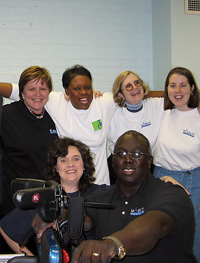ATLANTA - Of the more than 100 providers who supplied custom wheelchairs before Georgia Medicaid began mandating credentialing several years ago, only 25 remained in December, according to a state official.
"I'm really proud of (the requirements)," said Patricia Ross, program manager with the Georgia Department of Community Health. "I believe fraud and abuse will be cut to almost zero, because the providers that we suspect are doing that are going to stand out like sore thumbs. It's already happening."
The last leg of the state's credentialing initiative, a NRRTS's Certified Rehabilitation Technology Supplier (CRTS) designation, went into effect July 1, 2005. Earlier legs involved registering with NRRTS and passing the Assistive Technology Supplier (ATS) exam--both of which are required to become a CRTS.
One reason for the reduction in the number of custom wheelchair providers: Some have decided the high-end equipment will no longer be a part of the DME services they provide, Ross said.
The majority of providers who continue to supply custom wheelchairs, such as Mobility Designs, met the requirements before they took effect, said Kay Koch, who heads up education, training and marketing for the Atlanta-based provider.
Ross said she had heard from only one provider who wanted to remain in the rehab business but couldn't find qualified personnel.
At least two new providers have entered the state to provide custom wheelchairs: United Seating & Mobility, which acquired a provider that went out of business, and Custom Healthcare.
With a base of providers who meet the requirements solidifying, the state was scheduled to host two, one-day workshops on Jan. 24 and 25. The workshops, to be held at the Centreplex in Macon, Ga., were developed to bring manufacturers, providers and case managers together, Ross said.
"There are more than 300 case managers, and they seemed to get lost when it came to assistive technology," she said. "We wanted an opportunity to say to them, 'This is the equipment you can use, and these are the suppliers you can work with.'"
Koch, who was slated to give a presentation at the workshop, said despite receiving some flak for being too limiting (NRRTS doesn't allow manufacturers to be registrants, even if they sell direct to consumers), she's confident Georgia has done right by the requirement.
"(The requirement) raises the bar," she said. "Are you in the HME business or the rehab equipment business? There's a difference."




Comments